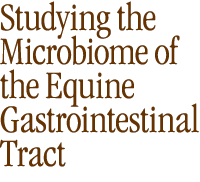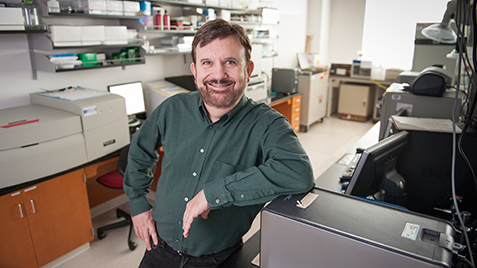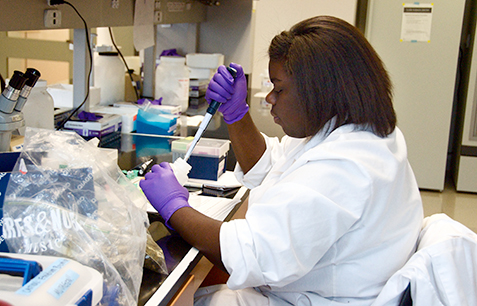

How can a study of what goes on in a horse’s gastrointestinal tract help us learn more about combating parasitic diseases that affect millions of people worldwide? Smith Professor Steve Williams is conducting a unique research project to find out.
/ Published January 29, 2014

Right now, some 150 million people worldwide are infected with the filarial nematode parasites that bring on the debilitating tropical disease of lymphatic filariasis, commonly known as elephantiasis, and African river blindness.
While the World Health Organization describes the disease as a “neglected tropical disease,” Steven Williams, Gates Professor of Biological Sciences at Smith, has been at the forefront, conducting extensive research projects designed to decipher the complicated molecular biology of such parasites, with the goal of eliminating these diseases. In 1994, Williams was the guiding force for the establishment of the Filarial Genome Project, under the auspices of the WHO, coordinating genome research on the parasites with the intention of developing new vaccines and drugs to prevent and ultimately eliminate human filariasis.
Most recently, Williams began a new research project to do a detailed study of a new aspect of the disease. It is the first known study of its kind.
“If we treat the human, make changes in the intestine and get rid of all the parasites, will changing the microbiome of that system affect anything? With the disappearance of the intestinal parasites in the tropics and Third World countries, will we see a dramatic increase in allergies and chronic autoimmune diseases—such as as Crohn’s disease, asthma and multiple sclerosis—that are occurring in the Western developed countries?” asks Williams, who created the first precise, practical way to detect the parasites that cause elephantiasis and African River blindness.

Molecular biologist Steven Williams is Smith’s Gates Professor of Biological Sciences.
And this is where the horse comes in.
“Horses are not a bad model for studying the interplay between parasites and their human hosts,” says Williams, who notes that the typical human and horse are similar hosts to a vast array of microbes and bacteria.
“The physiology and anatomy of a horse’s gut closely resembles that of a human. Horses ingest a lot of tiny parasitic nematode worms while eating grass. The worms impact the immune system while taking up permanent residence in their gastrointestinal tract,” he says. In both horses and humans, infection can lead to a variety of symptoms including retarded growth, weight loss and digestive disturbances.
Moreover, horses, in all their complexity, are quite prolific in producing environmental samples—that is, DNA-rich horse manure—that can be gathered right from their natural habitat. In fact the average 1,000-pound horse grazing on grass deposits about 35 pounds of manure a day.
Collecting the samples required for this metagenomic study from horses, rather than laboratory animals, has other advantages as well. Not a single animal was prodded or injected or confined during the course of the study—which began in the summer 2011 and aims to analyze the resident community of microbes, collectively known as the microbiome or ecosystem, following treatment with anti-parasitic drugs.
Once it was decided that the horse would be key to this study, Williams had to look no further than the herd of horses living on his own farm. Four horses provided the necessary raw material for his research. “We took fecal samples from the horses while they were infected, did egg counts per milligram of the parasites present and then treated horses with the wormer Ivermectrin. Then each day post treatment we collected new fecal samples and did more egg counts. We probably have 10 pounds of frozen poop in the lab freezer.”
Williams believes that his lab is the first in the country to conduct a metagenomics study of the microbiome of the gastrointestinal tract of horses following drug treatment in hopes of better understanding the interplay between the human gut and its ecosystem.
The Hygiene Hypothesis
In the last decade, scientists have come to recognize that for people who live in industrialized countries like the United States, modern hygiene has increased cleanliness. At the same time, it has diminished the likelihood of exposure to bacteria and infectious disease-causing parasites. Ultimately it has saved legions of lives.
But when it comes to health and disease, Williams is among those who say recent studies suggest a downside to being too clean. This hygiene hypothesis proposes that a dramatic increase in autoimmune disorders in industrialized countries may be due to the extermination of bacteria, not only the infectious kind (bad bacteria) but also diverse beneficial organisms (good bacteria), which are essential in regulating a body’s immune response system.
“Here in the United States, we have lived in a pretty clean environment for the past 100 years,” says Williams. “And while the numbers of parasitic infections are going down, we do seem to have skyrocketing increases in allergic and autoimmune diseases.
“If we are getting rid of one problem,” he wonders, “are we creating another bigger one?”
This is one aspect of what Williams is currently examining: the detrimental consequences of this hypervigilance about hygiene and subsequent war on bacteria, especially the species that are pathogenic and cause infectious diseases. In particular, eliminating the intestinal parasites along with the bacteria within the intestinal ecosystem, whether through sanitary measures, antibiotics or deworming drugs, also eliminates other microorganisms, such as the natural gut bacteria and fungi, which may be beneficial to the microbiome of the host body. This may upset the healthy balance of the gastrointestinal tract microbiome and, in turn, adversely affect the health of the horse (or human).

Graduate student Ashanta Ester, currently a Wilens Fellow working on her master’s degree in biological sciences at Smith, is a member of Williams’ lab team focusing on the metagenomic DNA extraction aspect of the equine gastrointestinal tract study.
Keeping Track of the Parasites: From the U.S. to Africa
Recent studies suggest that Americans have higher levels of autoimmune disorders than those living in less developed regions. According to Williams, “If you go to the still-developing countries that have a lot of the wormy diseases that I study, you will notice that what they don’t have yet are a lot of autoimmune diseases and allergies.”
No doubt about it, Williams says, the equine gastrointestinal tract study may have a broadened significance for his longtime research in the tropics where he has focused on the molecular biology of parasites that cause filarial infections such as elephantiasis.
Indeed, as one of the world’s leading researchers on filarial parasites, Williams and his laboratory team—including many Smith students over the past several decades—have created the first precise, practical way to detect the intestinal parasites that cause lymphatic filariasis, elephantiasis and African river blindness, diseases that afflict 1.4 billion people worldwide. In the laboratory, they have sequenced millions of bases of DNA from these parasites and identified new genes, which continue to provide the information necessary to further develop new vaccines and drugs to prevent these debilitating tropical diseases.
“There is a global program under way to eradicate these infectious diseases, and the plan is to treat more than 1 billion people to obliterate the parasitic worms,” notes Williams.
“But my question is this: We’re treating people all over the world and getting rid of the worms that cause disease. And what happens as more and more anti-parasitic drugs are being developed and the disease-causing parasites—I call them squatters—are disappearing from the intestines of their human hosts?
“Meanwhile, the intestine is a huge organ, and the millions of bacteria, including worms, that live there spur the development of a healthy immune system and a healthy immune response to diseases. With all these drug treatments, I worry that we are getting rid of one problem and, by suppressing the natural development of the immune system, creating another huge problem for a system that possibly has gone awry.”
“It’s not a very popular idea in my field,” Williams adds, noting that he has set out to do the research nonetheless. “I’m not advocating stopping the treatments, I only want to understand what’s going on. If we better understand the interplay between parasites and hosts, maybe we can do something about the rise in autoimmune system disorders.”
Williams Lab Receives $100,000 Gates Grant to Support Parasite Detection
In November 2013, Smith College received a $100,000 Grand Challenges Exploration Grant from the Bill & Melinda Gates Foundation—one of only 81 grants awarded worldwide—for research on health issues in the developing world.
The grant, spearheaded by Nils Pilotte, a doctoral student and research associate in the lab of Steven Williams, Gates Professor of Biological Sciences, will support detection of parasitic worms that cause lymphatic filariasis, a tropical disease that afflicts hundreds of millions of people in developing countries.
The grant specifies that Pilotte and Williams will develop an inexpensive and easy approach to monitor the presence of parasitic worms based on collecting and testing excreta of the mosquito vectors. Current approaches require capturing live mosquitoes that must then be manually sorted, which is labor intensive. Pilotte and Williams, however, will design and validate a mosquito trap and test its ability to detect the parasites based on mosquito waste products using a PCR (Polymerase Chain Reaction)-based method. They will then perform a pilot study in an endemic region over seven to 10 months.

















